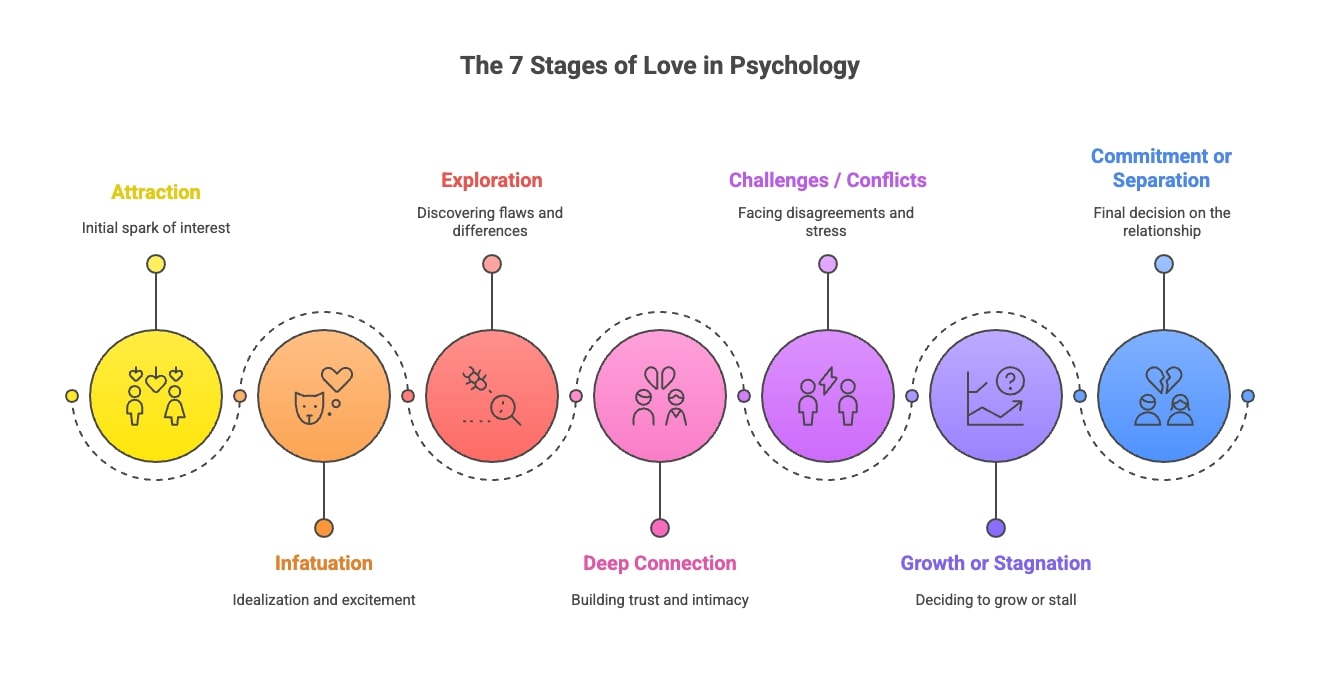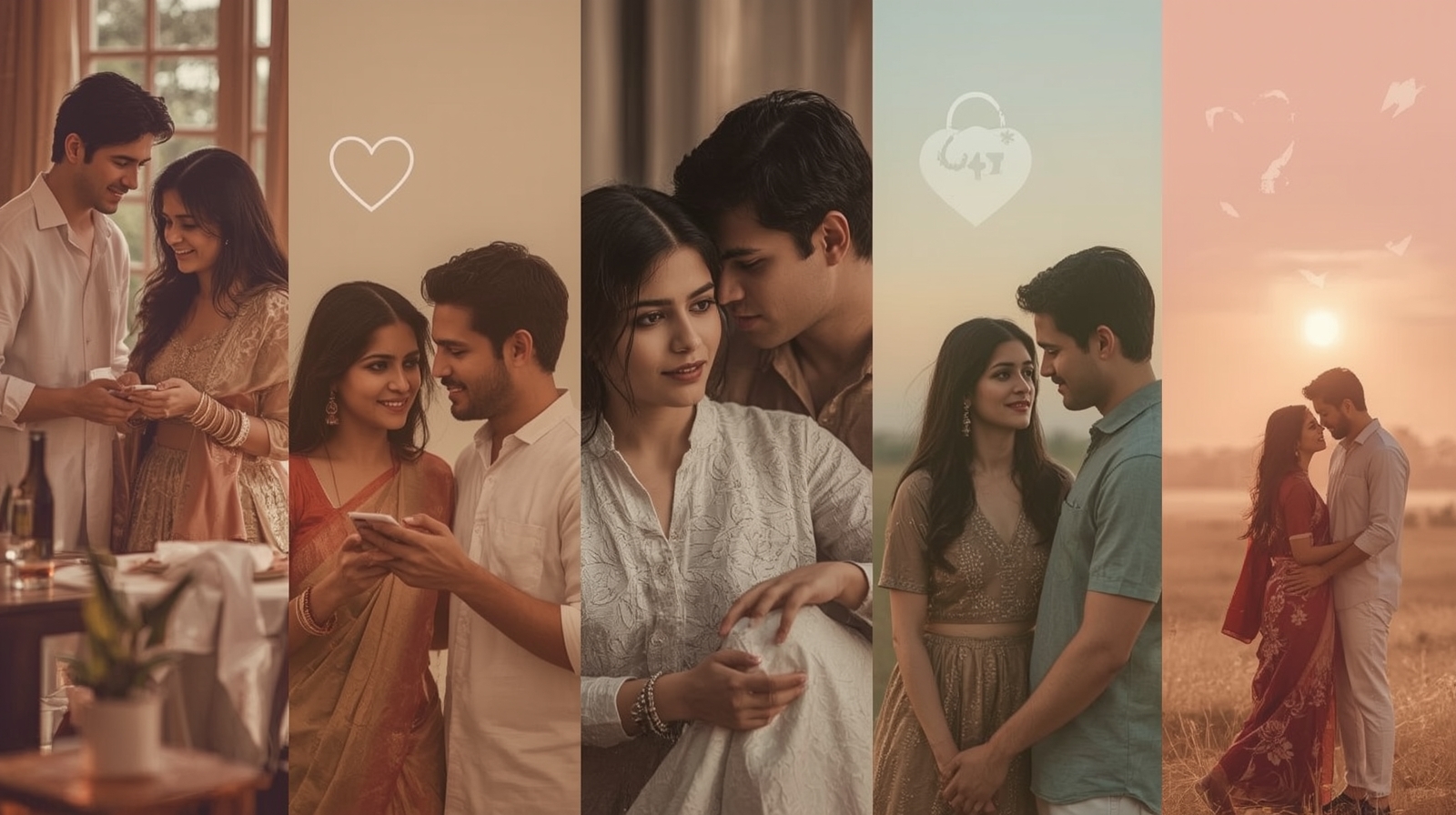
Amaha / / / The 7 Stages of Love: A Psychological Journey Every Couple Experiences
ARTICLE | 7 MINS READ
The 7 Stages of Love: A Psychological Journey Every Couple Experiences
Published on
27th Sep 2025

Serah Koshy
M.A, M.Phil

68% of Indian couples who break up do so during what psychologists call the "exploration stage" of love. Even more surprising? Most don't realise they're in a specific psychological phase that has predictable patterns and outcomes.
Ancient Indian philosophy spoke of different types of love from Kama (physical attraction) to Prema (unconditional love). Modern psychology has now mapped these into seven distinct stages that every romantic relationship navigates, whether it starts with a swipe on Bumble or an introduction by Aunty ji.
As leading relationship psychologist Soumya H. S. from Delhi's Amaha observes, "Understanding the 7 stages of love psychology helps Indian couples recognise that challenges aren't relationship failures, they're natural developmental phases that require different skills and approaches."

Need Help in Navigating the Difficult Conversations in a Relationship?
Speak to our Trained Relationship Counsellors and Couple Therapists to make your Love & Relationship Stronger
Understanding the Psychology Behind Stages of Love
The science behind stages of love reveals fascinating insights about human bonding. Our brains release different neurochemicals during each phase dopamine during attraction, oxytocin during deep connection, and cortisol during conflict stages.
But here's what makes Indian relationships unique: we often experience these 7 phases of love while simultaneously navigating family expectations, cultural pressures, and social obligations that Western psychology doesn't typically address.
Here’s the hidden fact: research shows that couples in India often get stuck between stage 2 (infatuation) and stage 3 (exploration). Why? Because family approval, caste concerns, or career uncertainty cut short the natural psychological process. It’s not just about feelings; it’s the ecosystem we live in.
The psychology behind phases of love shows that successful couples don't avoid these stages; they learn to navigate them together, they understand their partner’s love languages and tune their actions and words accordingly.

Stage 1: Attraction - The Initial Spark
That moment when something clicks. Maybe it's their laugh during a Zoom call, the way they handled a difficult situation, or simply how they looked in that Instagram story from Goa.
In India, attraction often begins in unexpected places - through mutual friends, at weddings, or even during those awkward "rishta meetings" that somehow turn genuine. The stages of love psychology show this initial phase is purely chemical, driven by dopamine and norepinephrine.
The psychology behind stages of love indicates this phase typically lasts a few weeks to months, setting the foundation for what comes next.
Problems in this stage: Attraction can be shallow looks, charm, or witty Instagram banter. Sometimes people rush into relationships before knowing who the other really is.
How to navigate: Slow it down. Enjoy the spark, but ask: “Do we share the same values?” Initial chemistry is exciting, but compatibility is what lasts.
Stage 2: Infatuation - The Butterflies Take Over
Welcome to the idealisation phase. Everything they do seems perfect. Their morning selfies make your day. Their random texts feel like poetry. You start planning your future together based on three conversations and their Spotify playlist.
This is where many people think they've found "the one." The 7 stages of love psychology warns us that infatuation creates a rose-tinted view of reality. You're not seeing them clearly, you're seeing your projection of perfection.
Stages of love for men often involve intense focus on the person, sometimes neglecting friends and hobbies. Stages of love for women frequently include detailed future planning and introducing them (mentally) to family circles.
Indian couples face additional complexity here because families might push for quick decisions during this emotionally intense phase. Take your time. This stage usually lasts 6-18 months often overlapping with attraction.
Problems in this stage: Idealising your partner makes everything they do seem perfect. But this stage blurs reality, and red flags often get ignored.
How to navigate: Stay grounded. Keep your individuality, and don’t confuse infatuation with lifelong love. Talk about real-life scenarios to test compatibility.
Stage 3: Exploration - When Reality Checks In
The honeymoon period ends. You notice they leave dishes in the sink. They don't text back immediately. Their sense of humour sometimes falls flat. Maybe they're not as ambitious as you thought, or their family dynamics concern you.
This exploration phase is where the psychology behind phases of love gets interesting. Your brain's chemicals stabilise, allowing you to see them as a real person rather than an idealised version.
"What will your parents think about my career choice?" becomes a common conversation. So does "Are you sure you want to move to Bangalore after marriage?" These aren't problems; they're necessary explorations.
Many Indian relationships struggle here because we're not taught that questioning compatibility is healthy. The 7 phases of love show this stage is essential for building realistic foundations.
Problems in this stage: You start noticing differences - habits, ambitions, or priorities. In India, this is often when questions about moving cities, careers, or parental approval come up.
How to navigate: Have honest conversations about the future early. Instead of fighting differences, ask: “Can we learn, adjust and grow together?”

Stage 4: Deep Connection - Building Real Intimacy
If you navigate exploration successfully, something beautiful happens. You start connecting on deeper levels; sharing fears, dreams, vulnerabilities, and those embarrassing stories you've never told anyone.
This stage of the 7 stages of love involves emotional intimacy that goes beyond physical attraction or shared interests. You feel safe being completely yourself, including your anxious moments, career doubts, or family pressures.
The psychology behind stages of love shows this is when couples develop genuine trust. You're not trying to impress anymore, you're choosing to be vulnerable.
Indian couples often experience this during longer courtship periods or early marriage, when you're navigating joint family situations together, supporting each other through career changes, or facing societal judgements as a team.
For many, this is the first time they experience unconditional acceptance from a romantic partner.
Problems in this stage: Many couples struggle to open up emotionally. Vulnerability is hard, especially in a culture where expressing feelings is often discouraged.
How to navigate: Build emotional intimacy slowly - share fears, insecurities, and dreams. Trust deepens when you feel safe being your true self.
Stage 5: Challenges and Conflicts - The Make or Break Phase
Every relationship hits this wall. Arguments about money, career priorities, family involvement, or future plans become frequent. Maybe his mother's comments bother you, or your ambition threatens him.
The stages of love psychology reveals this isn't a sign of incompatibility—it's a natural development phase where individual differences create friction.
Common Indian relationship conflicts during this stage include:
- Career vs. marriage timelines
- Joint family vs. nuclear family preferences
- Financial responsibilities towards parents
- Religious or cultural practice differences
- Location preferences for settling down
The psychology behind phases of love shows that couples who communicate openly during conflicts develop stronger bonds. Those who avoid difficult conversations often grow apart.
Therapy can be particularly helpful during this stage, providing tools for healthy conflict resolution and communication skills that many Indian families don't traditionally teach.
Problems in this stage: Misunderstandings, ego clashes, financial stress, or family disagreements creep in. For Indian couples, family expectations can add extra tension.
How to navigate: Conflict isn’t a sign of failure - it’s a test. Learn healthy communication: listen without interrupting, fight fair, and avoid dragging families into every argument.
Stage 6: Growth or Stagnation - The Defining Choice
Some couples emerge from challenges stronger and more connected. Others get stuck in repetitive conflict patterns or begin growing apart. This stage of the 7 phases of love determines your relationship's trajectory.
Growth happens when you learn from conflicts, develop better communication patterns, and start functioning as a genuine team. You begin supporting each other's individual development while building shared goals.
Stagnation occurs when couples avoid addressing core issues, stop communicating effectively, or become comfortable with unhealthy patterns.
In Indian contexts, external pressures often force decisions during this stage. Marriage pressure from families, peer comparisons, or social expectations can push couples toward commitment before they've truly grown together.
Stages of love for women often involve evaluating whether they feel truly supported and valued, while stages of love for men frequently focus on whether they feel respected and appreciated.
Problems in this stage: Some couples evolve through challenges; others stall. In India, this is where “marriage talk” often enters - sometimes too early, sometimes too late.
How to navigate: Be clear about timelines and expectations. If growth is possible, commit to working on it. If not, it’s okay to part before resentment builds.
Stage 7: Commitment or Separation - The Final Decision
The last of the 7 stages of love brings clarity. Either you both choose to commit fully to building a life together, or you acknowledge that you're not right for each other.
Commitment doesn't always mean marriage immediately, but it does mean choosing each other consciously, with full awareness of both strengths and limitations.
For Indian couples, this stage often involves family discussions, future planning conversations, and sometimes difficult decisions about careers, locations, or lifestyle preferences.
Separation, though painful, can also be healthy when couples recognise fundamental incompatibilities that can't be resolved through communication or compromise.
The psychology behind stages of love shows that couples who reach this stage with honest communication and mutual respect - regardless of their decision - have learned valuable relationship skills for future connections.
Problems in this stage: Not all relationships survive. Sometimes one partner wants marriage while the other isn’t ready, or long-term visions simply don’t align.
How to navigate: Be honest about what commitment means for you. It doesn’t always have to mean marriage, but it does mean clarity. Choose love with awareness or let go with respect.
Gender Differences in Stages of Love for Men and Women
Research reveals distinct patterns in how men and women experience these phases.
Stages of Love for Men: Men often experience attraction and infatuation intensely but may struggle with emotional vulnerability during deep connection phases. They frequently need more time to process conflicts and might withdraw during challenge stages before returning to problem-solve.
Stages of Love for Women: Women typically excel at emotional connection but may overthink during exploration phases. They often process conflicts through discussion and may feel frustrated when partners need space during challenging periods.
Understanding these differences helps couples navigate the 7 phases of love more compassionately.
How Therapy Helps Navigate Stages of Love
Professional counselling provides invaluable support throughout various relationship phases. Therapy helps with:
During Exploration: Learning healthy ways to discuss differences and concerns without judgement.
Deep Connection Phase: Developing emotional intimacy skills and vulnerability practices.
Conflict Stages: Acquiring communication tools, conflict resolution strategies, and individual emotional regulation skills.
Growth Decisions: Gaining clarity about compatibility, personal values, and relationship goals.
Many Indian couples benefit from culturally sensitive therapists who understand the unique pressures of family involvement, cultural expectations, and modern relationship challenges within traditional frameworks.
Navigating Love Stages in Modern India
Today's Indian couples face unique challenges as they balance traditional values with contemporary relationship approaches. The 7 stages of love psychology provides a roadmap, but the journey looks different for each couple.
Some start with arranged meetings and develop attraction gradually. Others begin with dating apps and navigate family approval later. Both paths experience the same psychological phases, just in different sequences.
The key is recognising that these stages of love are normal, predictable, and manageable with the right tools and mindset.
Cultural Considerations for Indian Couples
Indian relationships involve additional layers throughout the 7 phases of love:
Family Integration: Unlike Western dating, Indian relationships often include family approval processes that can accelerate or complicate natural progression through love stages.
Social Expectations: Timeline pressures for marriage can push couples through stages before they're emotionally ready.
Cultural Values: Balancing individual desires with family expectations requires extra navigation skills during conflict and growth phases.
Economic Factors: Career decisions, family financial responsibilities, and lifestyle expectations add complexity to commitment discussions.
Building Healthy Relationships
Understanding the psychology behind stages of love empowers couples to approach relationships more consciously. You can't skip stages, but you can navigate them more skill fully.
Love isn't just an emotion; it's also a skill that improves with practice, patience, and commitment to growth.

Frequently Asked Questions
What is the difference between love and infatuation in Indian relationships?
Infatuation involves intense attraction and idealization lasting 6-24 months, while love includes acceptance of flaws, long-term commitment, and deeper emotional connection beyond physical attraction.
How long does each stage of love typically last?
Infatuation lasts 6-24 months, attraction 2-6 months, dating varies widely, falling in love 3-12 months, true love develops over years, deep partnership takes decades.
Do arranged marriages skip the early stages of love?
No, arranged marriages often experience stages differently - attraction and infatuation may develop after commitment, but all psychological phases eventually occur naturally.
Can you fall out of love and back in again?
Yes, couples can cycle through different stages multiple times. Falling back in love requires conscious effort, renewed communication, and often professional counselling support.
What are the signs you're ready for the next stage of love?
Signs include increased emotional comfort, desire for deeper commitment, natural integration into each other's lives, and mutual future planning discussions.
Was This Article Helpful?
Yes
No



Build a good life for yourself
with Amaha
Best App
for Good
on Google Play India

Amaha is equipped to provide care and support for individuals experiencing severe psychological distress, including complex psychiatric disorders and other complex conditions. For those in need of more intensive care and daily support, we are launching an in-patient care facility in Bengaluru soon.
If you or someone you know is experiencing at-risk behaviors or safety concerns, or any other life-threatening crisis or critical mental health situation, contact a helpline or go to the nearest hospital or emergency room. Having a close family member or friend with you for support can be invaluable during this time.
For emergency mental health support, please call the national Tele MANAS helpline at 1-800 891 4416.